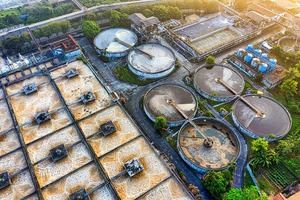Water Treatment Chemicals vs. Filtration Systems: Which Is Better? By Bisan Chemicals & Engineer Pvt. Ltd.
Body
In today’s industrial world, clean water is not just a need—it is a necessity. Whether it’s for manufacturing, processing, or utility purposes, industries require safe and treated water. When it comes to achieving this, two primary solutions come forward: industrial water treatment chemicals and filtration systems. But which one is better? Let’s dive into this comparison to help you decide the best option for your business.
Understanding Industrial Water Treatment Chemicals
Industrial water treatment chemicals are specially formulated substances used to purify water in industrial processes. These chemicals can remove harmful bacteria, suspended particles, and excess minerals. Some of the common types include coagulants, disinfectants, corrosion inhibitors, and scale removers.
One highly efficient modern chemical treatment includes the use of an industrial ozone generator, which disinfects water without leaving harmful residues. Ozone is a powerful oxidizing agent that eliminates bacteria and organic impurities effectively.
What Are Water Filtration Systems?
Filtration systems, on the other hand, physically remove particles and contaminants from water using membranes, sand filters, activated carbon, or reverse osmosis. These systems are widely used in industries for preliminary treatment or final polishing before usage or discharge.
Filtration works best when the contaminants are visible or suspended particles. However, it may not be as effective in removing dissolved chemicals or microbial organisms, especially in highly contaminated industrial water.
Effectiveness in Contaminant Removal
Water treatment chemicals are designed to target a wide range of impurities—chemical, biological, and physical. They are highly effective against microbial growth, corrosion, and scale, especially in cooling towers and boilers. Industrial ozone generators, for instance, offer a chemical-free yet highly efficient method for disinfection.
Filtration systems, however, are limited by the pore size of filters. While reverse osmosis can remove some dissolved solids, it is not always cost-effective for large volumes of water or high levels of contamination.
Cost and Maintenance
Chemicals generally require less upfront investment but need continuous supply and proper handling. A team must monitor chemical dosing to avoid environmental risks and ensure efficiency.
Filtration systems demand high initial investment but can be more stable in the long term if maintained well. However, membrane fouling, clogging, and replacement costs can add up, especially in industries with heavily contaminated water.
Ease of Operation and Control
Using chemicals offers more flexibility. Dosing can be adjusted depending on water quality. Bisan Chemicals & Engineer Pvt. Ltd. provides tailor-made chemical treatment plans suited to different industrial needs, ensuring optimal performance.
Filtration systems are automated to a great extent but less adaptable. Any major change in water quality might require system upgrades or complete replacement of filters.
Environmental Impact
Many industries now opt for industrial ozone generators because ozone treatment doesn’t leave harmful residues and has minimal environmental impact. Traditional chemicals can sometimes pose risks if not handled or disposed of properly.
Filtration systems are generally environmentally friendly but may generate waste in the form of concentrated brine or used filter media, which must be disposed of responsibly.
When to Choose Water Treatment Chemicals
Industries dealing with high biological contamination, scaling issues, or chemical pollutants find chemical treatment more effective. Chemical dosing is particularly helpful in cooling systems, boilers, and wastewater treatment plants.
When to Choose Filtration Systems
Filtration is ideal for industries needing mechanical separation of solids, like in food processing or textile industries. If the primary concern is sediment, turbidity, or taste and odor removal, filtration can be a great choice.
Can Both Be Used Together?
Yes. In fact, many industries benefit the most from a hybrid water treatment approach. For example, filtration systems can first remove suspended solids, followed by chemical treatment to disinfect and stabilize the water. Bisan Chemicals & Engineer Pvt. Ltd. often recommends this dual strategy to clients looking for comprehensive solutions.
FAQs
Are industrial water treatment chemicals safe for long-term use?
Yes, when handled and dosed correctly by trained professionals, they are completely safe and effective.
Is an industrial ozone generator suitable for all industries?
Ozone treatment is effective for many industries but may not be suitable where high organic load requires more powerful oxidants.
How often should filtration systems be serviced?
It depends on usage and water quality, but typically filters should be checked and cleaned every 3–6 months.
Which is more cost-effective in the long run—chemicals or filtration?
Chemical treatment may be more cost-effective for high-volume, high-contamination cases, while filtration might save costs in clean water applications.
Conclusion and Call to Action
Both water treatment chemicals and filtration systems have their own strengths. The best choice depends on your specific industrial needs, water quality, and long-term goals. At Bisan Chemicals & Engineer Pvt. Ltd., we specialize in providing custom water treatment solutions, including industrial water treatment chemicals and industrial ozone generators that meet the highest quality and environmental standards.
If you’re unsure which solution suits your industry best, contact us today for a free consultation. Let our experts design a treatment plan that ensures clean, safe, and efficient water for your operations. Your water quality is our priority!








Comments